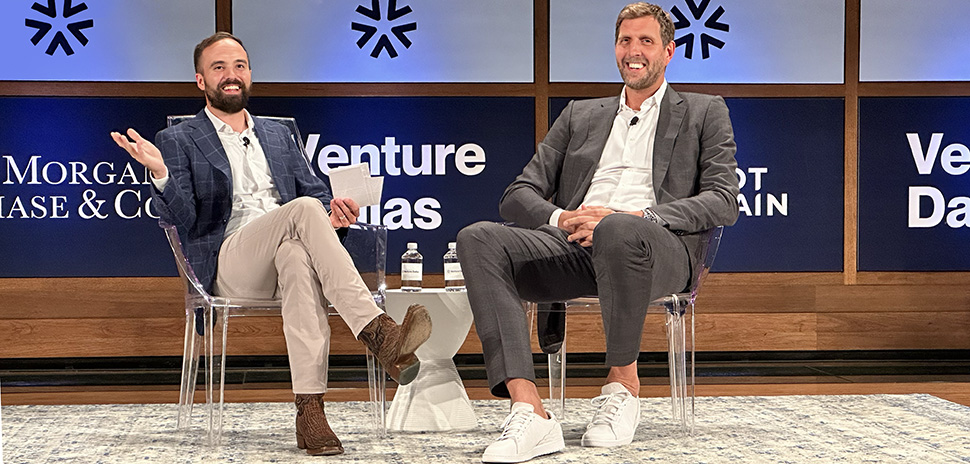Clark Hunt slammed it. Then Dirk Nowitzki dunked it.
Kansas City Chiefs and FC Dallas chairman and CEO Hunt opened the recent Venture Dallas conference with the first of two “Conversations with Champions.” Nowitzki capped off the event—just like he closed out so many Dallas Mavericks games with a buzzer-beating one-legged fadeaway—talking with Perot Jain partner and Venture Dallas Chair Aaron Pierce.
In an on-stage chat at the George W. Bush Presidential Center at SMU, Nowitzki recounted his journey from a sports-obsessed kid “chasing balls” in Germany to an iconic NBA legend. He recalled Mavericks owner Ross Perot Jr. flying to Germany to recruit him, saying, “He wanted to meet my family, and that meant a lot.”
Nowitzki and Pierce discussed the highs and lows of his Mavs career, from early culture shock to the glory of the 2011 Finals victory and seeing his own heroes show up for his final home game in 2019.
The 7-foot-tall, 12-time NBA All Star also talked about his lead-by-example leadership style, the deep meaning of loyalty throughout his life, and “vital support” from friends like Mark Cuban.
They dug deeper as Nowitzki shared his pride at carrying the flag of his native Germany at the 2008 Summer Olympics. He reflected on life after basketball — investing, advising, and philanthropy, including serving as a UNICEF Ambassador.
“I’ve never seen myself as a finished product,” Nowitzki said.
But again and again, Nowitzki’s focus returned to what Dallas has meant for him, a city that “gave me confidence that I could make it work here.”
On October 30, 2019, Dallas named a street Nowitzki Way in the heart of downtown, a unanimous decision by the City Council in appreciation for all Nowitzki has done for the region, both on and off the court. It may not be as long and winding as the Q&A you’re about to read, but that street and this city will always be his. And the conversation below illustrates why.
Conversation With a Champion:
Dirk Nowitzki
AARON PIERCE: Let’s start from the beginning. What was it like growing up in Germany?
DIRK NOWITZKI: I grew up in a supportive household, and as you might imagine, my parents played sports: handball and basketball; my sister played basketball, too. Everyone saw me chasing balls and playing sports like tennis, handball, and, eventually, basketball. That’s all I wanted to do. I was tall for my age, obviously, and by 15, I focused on basketball, or I’d still be playing three sports at once. Looking back, I guess I made the right decision.
I’d almost say I was a Pygmalion with basketball. I was obsessed. It was all I was doing all summer: watching it, doing research, and practicing.
PIERCE: Before you chose basketball, what did you think you might want to be? When I was younger, I wanted to be in the army, then a pastor, and eventually I found myself in venture capital. What was your journey?
DIRK NOWITZKI: I wanted to be a tennis player first. Steffi Graff and Boris Becker were tennis legends. But then basketball came along. After I started playing at age 12, I dove in deep. I would get up in the middle of the night to watch all-star games and every final I could. There weren’t many games on TV in the 90s, but whatever I could find, I was watching.
That was around the early 90s when I started. Michael Jordan was the GOAT—is the GOAT—and he’ll always be my hero. I was a huge fan and dreamed big. I wasn’t sure if I’d get the chance to [go pro], but I met some coaches and mentors who helped make that dream possible.
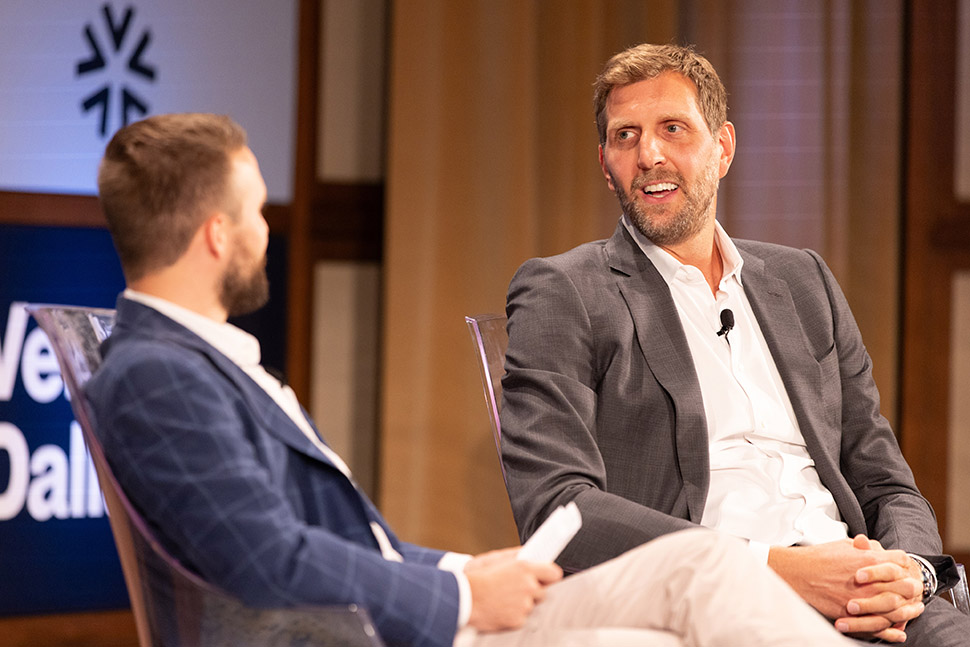
[Image: Grant Miller Photograph/Venture Dallas]
The early days: ‘We’re ready for you.’
PIERCE: You played 21 seasons for the Mavs. Let’s talk about the early days, starting when you were 18 years old. How did you end up in Dallas?
DIRK NOWITZKI: I finished high school in Germany and served in the army for 10 months—it was still mandatory at that time. After I got out, I wasn’t sure what to do next. I knew I had some talent: Should I stay in Europe and join a professional club, or play in Italy? Or should I go to college? I had 50 college offers and also interest from some NBA scouts. I was all over the place.
I ended up being drafted by Milwaukee, but Dallas acquired my rights on draft night. Ross Perot Jr. was the owner of the Dallas Mavericks back then. Ross and Mavericks Coach Don Nelson flew to my hometown in Würzburg, Germany. That was big time, right? Ross flew in and showed respect. He wanted to meet my family, and that meant a lot.
They said, “We’re ready for you. Why don’t you come to Dallas and look at the city. You can meet the team and make a decision whether you want to come or not.”
Sure enough, we flew to Dallas a couple of days later, and we met the famous Steve Nash, who was a great teammate and is still a good friend. They said, “Listen, we’re a young team; there’s really not a lot of pressure. We’re not a playoff team as of now. You can grow into yourself, and we’ll help along the way. So I said, “Okay, I’ll do it.”
When I got to Dallas, I was 20 years old, and I’d always lived with my parents. It was a huge culture shock left and right. I didn’t really understand the slang in the locker room. I was lost half the time, especially in my first year. But it was a good year to go through, to learn about the culture here, to develop myself, and to understand a little more of the language. Looking back, it was a tough year, but necessary. I needed to get comfortable and set the right path to success.
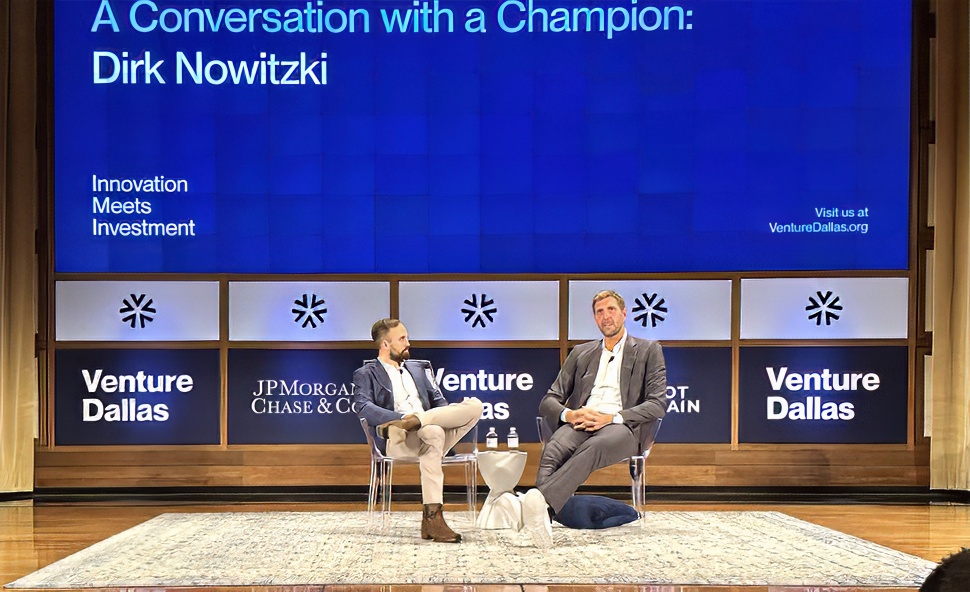
[Photo: Dallas Innovates]
On sticking with Dallas: ‘It was a no brainer.’
PIERCE: It doesn’t surprise me that Ross convinced you to move to Dallas as he has done with many people so well. When I think “Dirk,” I think many things: hard work, perseverance, and, of course, the GOAT. But one thing that stands out is loyalty. You picked Dallas, and you stayed with Dallas even when you had several opportunities where you could have gone anywhere in the NBA. You chose Dallas over and over. Tell us a little bit about why you did that.
DIRK NOWITZKI: I felt like Dallas was an amazing city. But when I first came here, I didn’t know what to expect. I had lived in Germany and Würzburg my whole life. Coming here, I wasn’t sure if guys still rode around on horses. And I couldn’t just Google something quick back then; it was way before that. All I remember is that my parents were watching the TV show “Dallas.”
I thought, “Wow, there are real buildings. They’re like skyscrapers.” It was amazing. And the people here were lovely from the beginning, supporting me. I felt the love. People wanted me to succeed, which seemed odd because I didn’t have an especially good first year.
It gave me confidence that I could make it work here. In my second year, my now-good friend Mark Cuban bought the team. He became one of my biggest supporters, and we built a great friendship from the beginning.
Mark made me his franchise player. And even off the court, he helped me many times with things. He was just my No. 1 supporter. Factoring all that in—the city, Mark buying the team, and the Mavs growing and improving—it was a no-brainer that I wanted to be here. I wanted to finish my career here. The only reason I would have had to look elsewhere later in my career would be if we hadn’t won the championship. If you’re a competitor, you want to win at the highest level.
Once we did win the championship, I knew I would retire here.
On the highs and lows of champions: ‘You come back better.’
PIERCE: That was huge. Reflecting on the championship runs, let’s talk about the highs and the lows. In the audience, we have many entrepreneurs, and they also ride those high highs and low lows. You experienced that in your career when you went to the championship the first time and didn’t pull it off, but then came back. How did you manage that personally and professionally?
NOWITZKI: It’s hard. As a competitor and as someone who wants to build something, you take losses hard. You need to learn how to get over the tough times and not take them to heart. It hurts, and you have to be disappointed and frustrated. But a circle of friends will help you through the tough days, and you know there are better days ahead. You get motivated and focused again on the next season to become a better player, a better person, and help the team more. It’s normal to be disappointed and frustrated. But you need to look forward and learn from the experience.
There were numerous disappointments. Like the time I was the MVP in 2007, and we were the first number-one seed losing to an eighth seed. I was so embarrassed; I didn’t want to leave my house for weeks. Those were tough, tough days. But like I said, with the support system of friends and family and a network, you build yourself back up, look forward to new things, and come back better. I spent hours talking to them.
PIERCE: What made that championship team of 2011 so special? It seemed like that year, the stars aligned, and you guys were clicking.
NOWITZKI: We didn’t know that at the beginning of the season. I thought we had a good group. We had veterans who had achieved individual things but never won a championship. Our biggest strength was having older guys who knew how to play, put their egos to the side, and pull together in the right direction. We gained momentum towards the playoffs and asked how we could play our best basketball then.
Just like in business, it’s important to have clear roles. Everyone knew their job, whether coming off the bench or being a starter. We needed everyone “in” during that two- to three-month playoff run. It was a group that wanted to win with each other and had no ego issues. It was a special, special run.
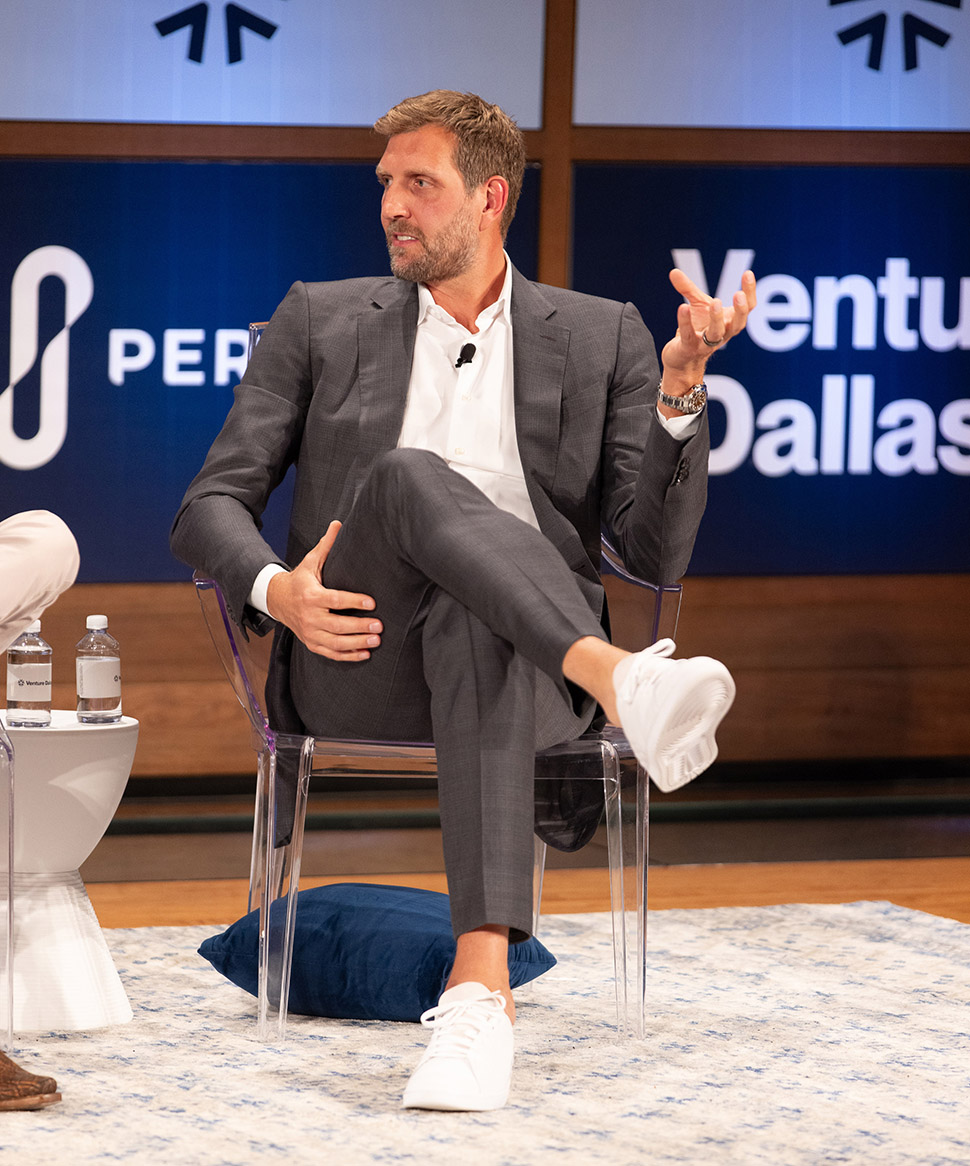
Dirk Nowitzki [Photo: Grant Miller Photography/Venture Dallas]
On leadership: ‘You have to find your own way.’
PIERCE: Your style of leadership is inspirational. How do you describe leadership?
NOWITZKI: I always think there’s not just one mold of leadership. You have to find your own way. For me, I wasn’t the guy to stand in front of the team and hold 30-minute speeches—that’s just not my personality. It’s just not who I am. And I didn’t want the team to think, “That’s not really him; that’s fake.”
I tried to lead my way, and that was to lead by example. That meant working hard, taking extra shots, and being the first one there and the last one out. It meant playing every game—hurt or sick—and always being there for the team.
Everybody looked at me as a leader, but I think we had other emotional leaders that year with Tyson Chandler and Jason Kidd, guys that were comfortable in that role of speaking and addressing things.
Later, I got a little more comfortable where I might see something during the game and pull somebody over to share my views. But I was never a “rah, rah, rah” guy—that was not my role. My role was to be the best player and lead these guys by example.
On mentors and advisors: ‘Holger pushed me.’
PIERCE: You mentioned your relationship with Mark Cuban earlier, and you had a great relationship with former basketball player and coach Holger Geschwindner throughout the course of your career. Tell us about your mentors and advisors, and how they were important.
NOWITZKI: I met Coach Holger when I was about 15. He basically taught me everything I knew on the basketball court, but he always wanted me to grow outside the court. I was struggling in school, playing three sports at the same time. He and some other mentors helped push me through school. I was given books every year for Christmas and my birthday. It was like, “Sweet, another book I’ve got to read.” But Holger pushed me: Let’s travel; let’s see different cultures; let’s learn an instrument. I’ve played saxophone, drums, and guitar. I had to try all that. It was his philosophy. It was about being an all-around person.
Holger became my mentor. He helped me, obviously, through tough times early in my career here in Dallas. When things weren’t going well, I was on the phone every other day: “This is just not working. What do you want me to do?” And then he’d be on a plane and be over two days later, and we’d work on stuff again. So he was huge for me.
In every walk of life, you need mentors; you need guys to talk to—guys who have been through the same stuff that can help you along your way. He was vital for my success in my career. Now he’s almost 80, and I just saw him last week in Germany. We’re still close friends.
PIERCE: A large part of Venture Dallas is building community. Those communities include the people who are there for you during the lows and celebrating the highs. You’ve surrounded yourself with great people, Holger being one of them. But I have another question: Thinking back, was there one player you absolutely hated playing against?
NOWITZKI: Well, there’s a few. But as a team, we all hated to play the San Antonio Spurs. They were just so annoyingly good. Basically, for those 20 years, they were solid; they weren’t flashy. And they were well coached; they knew our place better than we knew our place, and they were so well prepared. They were great defensively.
They were just a force every time we played. It felt like those games always brought the best out of us to compete at the highest level against the Spurs. I give the franchise a lot of credit for what they did for basically two decades with five championships. As far as individuals, there were certain players here and there. Kevin Garnett was one guy it seems like I got tangled up with in one game or another. But I loved his competitiveness and energy. The things he brought to the game made you step up and bring out the best in yourself.
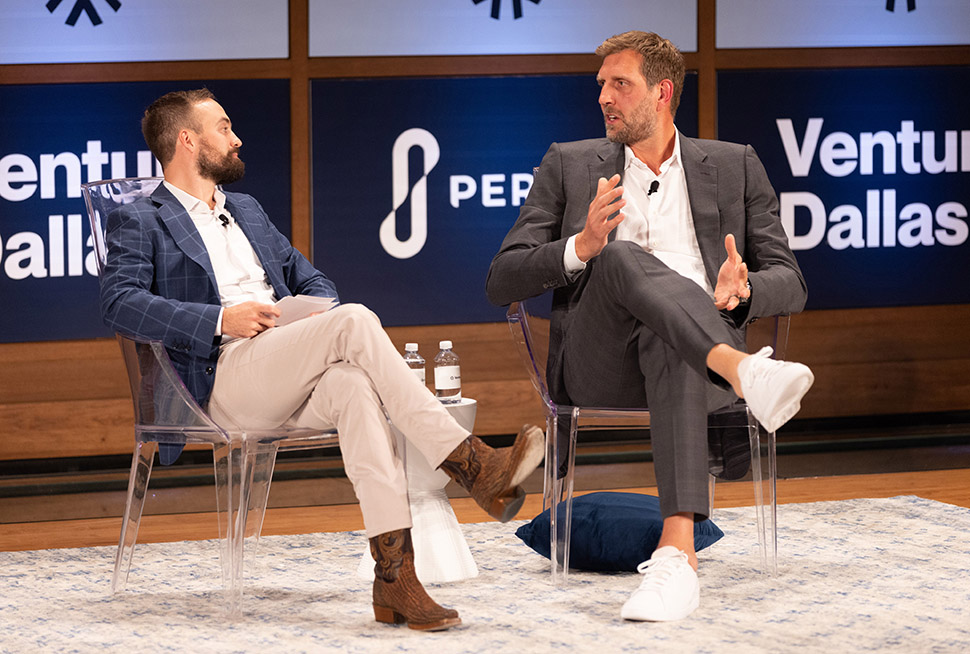
Aaron Pierce and Dirk Nowitzki [Photo: Grant Miller Photography/Venture Dallas]
On the journey to great: ‘You always push to get better.’
PIERCE: Let’s talk about greatness. During your career, you’ve embodied that for many people in Dallas, the U.S., and beyond. Tell us about the journey. It comes with a lot of hard work. What does it require? What does it look like to be great?
NOWITZKI: Well, first, you need some talent. I think that’s obvious. Not everybody can be a 20-year NBA player. So I think that comes from my parents, but a lot of stuff is hard work. Like a lot of business people, athletes are perfectionists. If you have a good game, you think, “Now I’ve got to work harder. Because if I don’t keep this up, I might slip. If somebody else plays better, you go to the gym the next day. Or, you think, “I was really bad,” so now I’ll take some extra shots. So every day is a grind, and you never settle; you never rest. You always push to get better. That’s what I was trying to do. I’ve never seen myself as a finished product.
I’ve always wanted to learn new stuff. Even in my 30s, I would still go work with my coach in Germany for six or eight weeks, putting myself through a program I didn’t want to do to stay in shape and keep learning. It’s just being a perfectionist and being obsessed with being and getting better. Trying to win and be the best version of myself—that’s what drove me. I never wanted to settle.
On life “off the floor”
PIERCE: Today, you’re an investor, you’re a philanthropist, and you’re an advisor. Tell us about some initiatives that you’re working on today.
NOWITZKI: Investors—there’s a strong word. I’m not sure if it makes me Warren Buffett here, but I’m having a lot of fun. I was so all in on basketball for two decades: I was eating, sleeping, and breathing basketball. These last four years have been a fun transition.
We created a family office, and we do some small things. It’s been super interesting for me to learn the whole business world. There are a lot of sharks out there. I go to meetings and get stuff pitched. They throw in all these terms, and afterward, I’m Googling. I’m like, “What did you just say?” It’s been a super cool learning curve in the last couple of years.
But I’m still staying close to basketball. I’m doing a little advising for the Mavericks. Since we have little kids, the advisor role is perfect for me at the moment. I’m also on the board of the International Basketball Federation, FIBA, which sits in Geneva.
I go to Switzerland and all the big tournaments—the World Cup and the Olympics. We have meetings and try to give back to international basketball for what it’s done for me and my career. Our three young children are starting their sporting careers, so I’m there supporting them. I have a foundation here and in Germany, along with tons of sponsors there, so I travel there every six to eight weeks.
Honestly, I thought I’d fall into a little hole after my career, but it never happened. It’s been one thing after another—so many blessings, so many cool things with the naming of the [Nowitzki] street, the [“All Four One”] statue, and the Naismith Memorial Basketball Hall of Fame. I think things will slow down a little bit now. But it’s been a wonderful journey off the floor.
Editors note: Dirk Nowitzki received many accolades post-retirement, including being honored in Dallas with a section of Olive Street renamed “Nowitzki Way” in 2029 and a statue unveiled at the American Airlines Center in 2022. He was also enshrined in the Naismith Memorial Basketball Hall of Fame with his Hall of Fame speech in August 2023. “No. 41” hangs in the rafters at American Airlines Center.
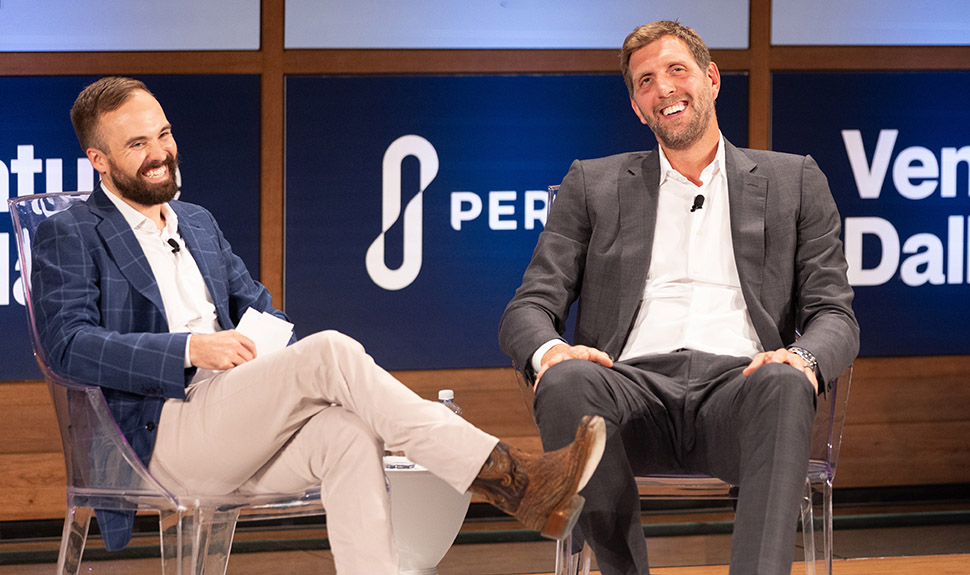
[Image: Grant Miller Photograph/Venture Dallas]
On No. 41’s last home game
PIERCE: I had the chance to go to your last game when so many people showed up to honor you. What was it like to see all these legends of basketball show up for you in that way?
NOWITZKI: It was incredible. Leading up to that, people knew that I would retire. But I didn’t want to talk about it. I didn’t want a goodbye tour—none of that. I wanted to be low-key, and I didn’t want to be the center of attention all the time. But it would naturally happen anyway, everywhere I went on the road. People gave me a standing ovation. I thought, “Wow, these people want me to retire.”
But it was just wonderful how it happened. People in my circle obviously knew that I couldn’t do it. The foot gave up a little bit. Physically, I wasn’t there anymore. The Mavericks knew this was going to be it.
Before my last home game, they told me, “Hey, after the game, we’ll just have a little celebration for you.” And, of course, I didn’t want to hear about it. I still had to play the game. The next night, I had to play San Antonio.
The Mavericks asked me who my top five favorite players were, and I mentioned them in passing. When my last game ended, I was sitting there, knowing they were about to do a little ceremony for me. But suddenly I heard people screaming, and I looked up: There was a video of Charles Barkley, Scottie Pippen, and all these other guys.
That meant a lot for some of my heroes to show up at my last home game. I’ll never forget it. There were so many amazing moments during those 21 years that I’ll remember for the rest of my life, and that was one of them.
Editors note: In his final home game on April 9, 2019, Dirk Nowitzki faced off against the Phoenix Suns, leading the Mavericks to a 120-109 victory with a contribution of 30 points.
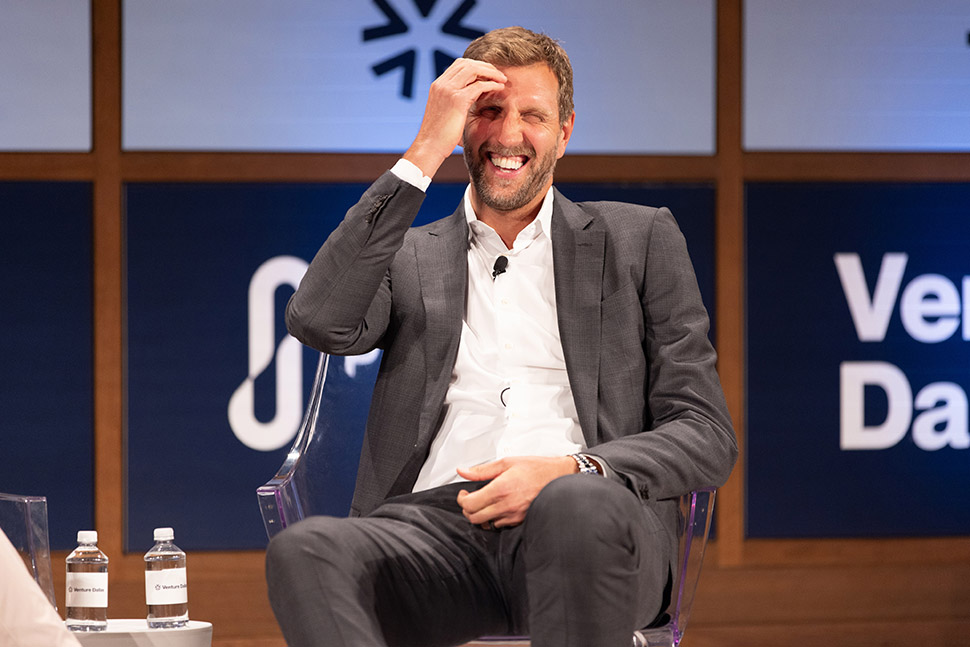
Dirk Nowitzki [Photo: Grant Miller Photography/Venture Dallas]
On the family sporting life: ‘I’m like a tall kid myself at age 45.’
PIERCE: You and your wife, Jessica, have three kids. You mentioned they’re playing sports. Do any of them have a professional sports outlook?
NOWITZKI: As you know, we come from a sporting family, and my wife played tennis growing up. She’s pretty good. My wife’s twin brothers were professional soccer players in England, and now they’re back in Sweden; one plays for the Swedish national team. So, there’s plenty of sports for the kids to try. For now, they’re doing tennis and soccer. My oldest is a girl, she’s 10. And then we have two boys. They’re eight and six.
Those are great ages, as I’m sure you guys with kids know; they’re curious. They’re starting their journey in school sports, and it’s been super fun to be involved.
I met Jess during an NBA All-Star game in 2010, when we had the big All-Star game out at Jerry World in Arlington. We were both at the charity event. I knew her boss, and asked, “Who’s your friend?” And the rest is history.
We’ve been married for 10 years and have three beautiful children. It’s been a fun journey off the court: I’ve always wanted to be married, always wanted to have kids. I’m like a tall kid myself at age 45.
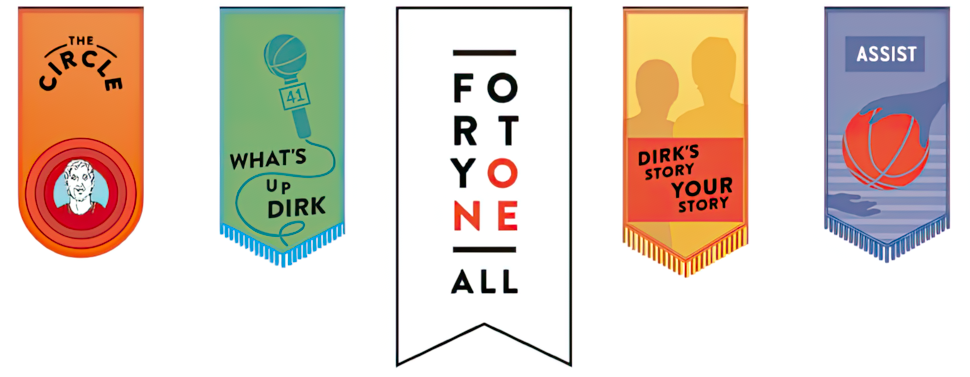
On philanthropy
PIERCE: Good thing you made the All-Star game that year. I understand you’re both hosting a food drive on November 9. How can folks in this room get involved and just share a little bit about what you’re doing and why you’re doing it.
NOWITZKI: We’ve done a couple of food drives that started during the pandemic when some folks were not doing well. It’s something we’ll continue to do. Usually, we do these around Thanksgiving, like this year, and we’ve done one around Mother’s Day. But that’s not all we do.
We support shelters and organizations in the area. Over 20 years, we’ve raised many funds for great organizations, whether in education or well-being. It’s been a great journey with my foundation, too. My wife, who used to work in the nonprofit world, is the president. We’ve been working together on some amazing stuff, and I’m proud of how the foundation grew.
If you want to get involved, you can go to the website forty.one. There’s a “Donate” button on there. And if you come out, you can volunteer at one of our events—whatever your heart desires. It’s been fun, and we can make an impact in the community as well.
The conversation was edited for brevity and clarity.
Dallas Innovates is a media sponsor of the Venture Dallas 2023 conference held October 25, 2023, at the George W. Presidential Center in Dallas.
![]()
Get on the list.
Dallas Innovates, every day.
Sign up to keep your eye on what’s new and next in Dallas-Fort Worth, every day.

